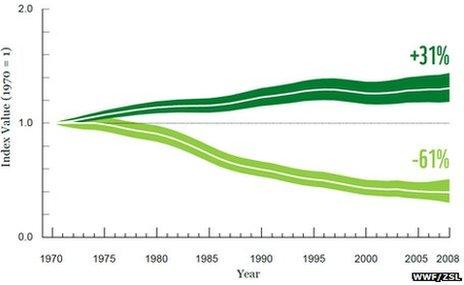Rio+20 summit leaders 'must improve nature protection'
- Published

Animals in the tropics are facing the severest threats and showing the worst declines
Environmentalists say leaders at June's Rio+20 summit must urgently step up nature protection, as a report confirms a 30% decline in wildlife since 1970.
The <link> <caption>Living Planet Report</caption> <url href="http://wwf.panda.org/about_our_earth/all_publications/living_planet_report/" platform="highweb"/> </link> combines data on more than 9,000 populations of animals across the world.
<link> <caption>Rio+20</caption> <url href="http://www.uncsd2012.org/rio20/index.html" platform="highweb"/> </link> is billed as a chance for world leaders to put global society on a sustainable path.
But the report's main authors, WWF, say progress on nature protection and climate change is "glacial".
"The Rio+20 conference is an opportunity for the world to get serious about the need for development to be made sustainable," said David Nussbaum, CEO of WWF-UK.
"We need to elevate the sense of urgency, and I think this is ultimately not only about our lives but the legacy we leave for future generations."
The Living Planet Report uses data on trends seen in various species across the world, compiled by the Zoological Society of London (ZSL).
Further analysis from the Global Footprint Network aims to calculate how sustainable our global society is in terms of its overall ecological footprint - a composite measure of issues such as fossil fuel burning, use of cropland to grow food, and consumption of wood and wild-caught fish.
Tropical waste
For this edition of the report, ZSL has examined more species (2,600) and more populations of those species (9,014) than ever before.
Overall, these populations show a decline of about 30% since 1970 - the same figure as in the last edition, published two years ago.
Tropical species show a decline of more than 60%, while in temperate regions there has been an average recovery of about 30%.
The worst affected species are those in tropical lakes rivers, whose numbers have fallen by 70% since 1970.

The director of the ZSL's Institute of Zoology, Professor Tim Blackburn, likened the figures to a stock market of the natural world.
"There would be panic of the FTSE index showed a decline like this," he said.
"Nature is more important than money. Humanity can live without money, but we can't live without nature and the essential services it provides."
One of the draft recommendations for Rio+20 is that governments should develop and use economic indicators that include valuation of "natural capital".
Cotton buds
The global footprint analysis, meanwhile, concludes that humanity is using one-and-a-half times more natural resources than the Earth can sustainably supply.

Land clearance for agriculture is a major driver of biodiversity loss and climate change
The Persian Gulf emerges as the region with the highest per-capita ecological footprint, with Qatar, Kuwait and the United Arab Emirates topping the list of the least sustainable nations.
The US makes the top 10, which also includes Denmark, Belgium, Australia and Ireland. The UK ranks 27th.
A new measure that WWF has developed allows tracking of water scarcity in 405 river systems across the world on a monthly basis.
It reveals that 2.7 billion people experience a lack of water for at least one month each year.
The report highlights some examples of progress on sustainability, such as a programme in Pakistan that has helped cotton farmers slash water, pesticide and fertiliser use while generating the same yield.
It also highlights areas that could be tackled urgently, such as the 30% wastage of food caused by profligate behaviour in the West and by lack of storage infrastructure in developing countries.
Mr Nussbaum said it was not too late to turn existing trends around, but "we need to address this with the same urgency and determination with which we tackled the systemic financial crisis globally".
Follow Richard <link> <caption>on Twitter</caption> <url href="http://twitter.com/#!/BBCRBlack" platform="highweb"/> </link>
- Published21 March 2012
- Published21 January 2012
- Published19 May 2011